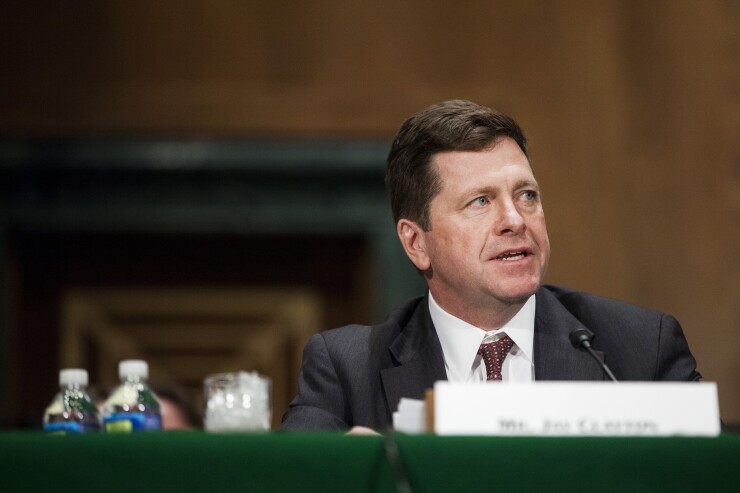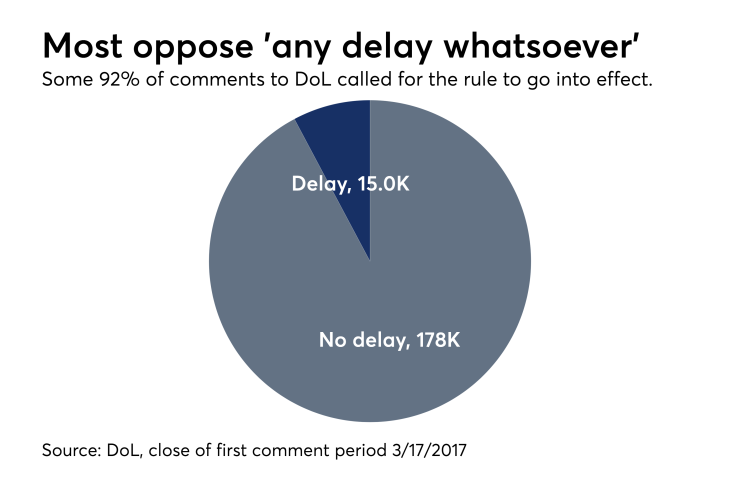The SEC’s tentative steps into the ongoing fight over the fiduciary rule drew industry praise while also raising questions. Chairman Jay Clayton asked for renewed public input, leaving many wondering: After being authorized to craft its own fiduciary rule since 2010, is the SEC finally going to act?
"While we look forward to working with the commission to develop a strong, pro-consumer standard, experience has taught us to take these commitments with a grain of salt," says Barbara Roper, director of consumer protection at the Consumer Federation of America.
Indeed, Clayton's predecessor, Mary Jo White, said for several years that a fiduciary standard was a high priority for her. The commission was authorized to create one under Dodd-Frank. But the SEC's commissioners were often at odds, and though studies were done, no action was ultimately taken.
Clayton,
-
Labor Secretary Alexander Acosta may have left a little wiggle room for future revisions.
May 23 -
Adviser Dan Moisand was surprised by the decision not to delay the fiduciary rule further. But he wasn’t put off. Here’s why.
May 23 -
There is "no principled legal basis" to do so, Labor Secretary Acosta says.
May 23
"Given the significance of these issues — in particular, for retail investors looking to save for the things that matter most to them, including homeownership, education and retirement — I look forward to robust, substantive input that will advance and inform the SEC's assessment of possible future actions," Clayton wrote.
"When you listen to both Secretary Acosta and Chair Clayton, it's clear that they are working on coordinating a response," says Bradford Campbell, a partner at law firm Drinker Biddle.
COORDINATION
Although some industry observers may have a sense of déjà vu seeing an SEC chief call for action on a fiduciary standard, others suggest this time may be different.
"I think it's a very positive development. When you listen to both Secretary Acosta and Chair Clayton, it's clear that they are working on coordinating a response," says Bradford Campbell, a partner at law firm Drinker Biddle.
With the rule's implementation date around the corner, here’s what wealth managers should focus on in coming weeks and months.
The regulatory environment has changed significantly because the Labor Department's rule is now going into effect, impacting millions of Americans saving for retirement, he says.
"It's not a question of when it will happen; it is happening. And that is having an effect on advisers under the SEC's jurisdiction," says Campbell, who was also an assistant secretary of labor for employee benefits and former head of the Employee Benefits Security Administration during the George W. Bush administration.
How the SEC and Labor Department might coordinate is something of an open question. In his memo, Clayton outlined a number of areas of concern. For example, he asked about confusion among retail investors as to what standards of conduct actually apply to brokers and advisers.
"To what extent has this reported confusion been addressed?" he asked.
Michael Renetzky, a partner at law firm Locke Lord, says a significant issue to address would be how different standards of conduct apply to different client accounts.
"This is a critical policy challenge created by the current DoL fiduciary rule, and there has already begun to be discussion by financial institutions of several proposed product and fee changes which appear to directly shift various costs from accounts subject to the rule to those not subject to the rule," Renetzky says.

LONG ROAD AHEAD
Industry trade groups that have vigorously opposed the Labor Department's rule and called for the SEC to take the lead were quick to praise Clayton's moves and pledged to work with him.
"SIFMA has long-supported the creation of a best interest standard for brokers who provide personalized investment advice, and we continue to believe that the SEC is the appropriate regulator to do so," CEO Kenneth Bentsen said in a statement. IRI and FSI also applauded Clayton's decision.

Some fiduciary advocates, however, expressed concerns that an SEC standard would be robust enough to protect investors properly.
"Any work done by the SEC should not stymie or undercut the fiduciary rule that will be implemented by the Department of Labor," the Financial Planning Coalition, comprised of the CFP Board, the FPA and NAPFA, said in a statement. "Requiring financial professionals to work in the best interest of Americans and their finances is an essential and long overdue reform; many in the financial services industry have already acknowledged and implemented practices to comply with a standard fiduciary rule," the coalition added.
Ron Rhoades, a longtime independent financial planner who's now a professor and director of the financial planning program at Western Kentucky University, says he is "cautiously optimistic" about the SEC announcement.
"Many players in the securities industry have suggested a new 'best interests' 'new federal fiduciary standard' that is just suitability enhanced by casual disclosure. If the SEC is to act in this area, it needs to adopt a bona fide fiduciary standard for all those who provide personalized investment advice, similar to the impartial conduct standards adopted by the [Labor Department]," Rhoades says.
Even if the SEC is serious about crafting a standard and moves toward doing so, experts caution that the gears of government typically grind slowly.
"A rule can take years to come to fruition," says Tamar Frankel, professor of law at Boston University. The Labor Department's fiduciary rule, Frankel notes, was six years in the making.






